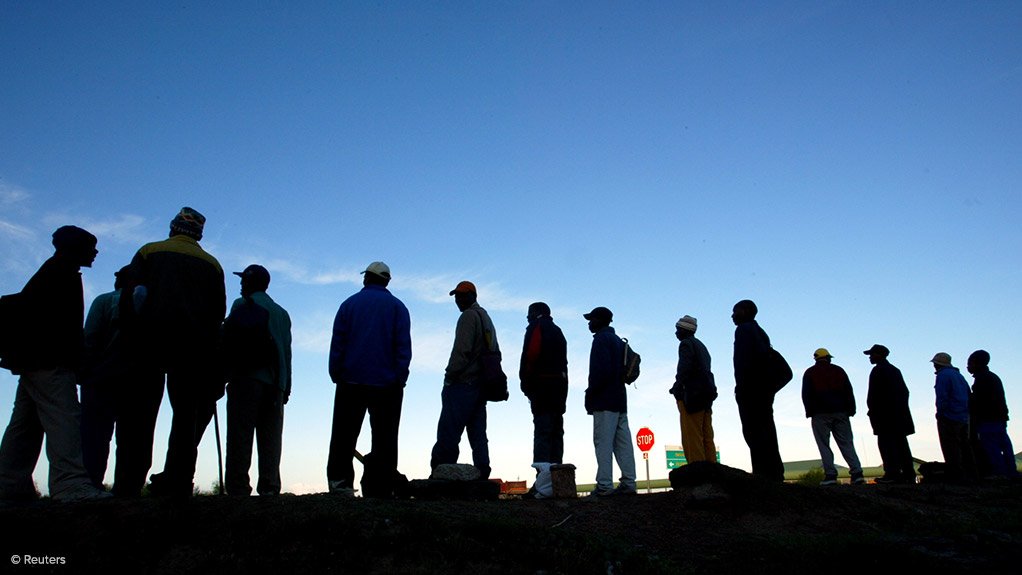Political parties on Tuesday expressed concern with the second quarter unemployment rate, which reveals a worsening jobs crisis in the country, with ActionSA and the Economic Freedom Fighters (EFF) criticising the Government of National Unity (GNU) for not having a plan to stimulate growth.
Statistics South Africa reported that the unemployment rate worsened by 0.3 of a percentage point to 33.2% in the second quarter, compared with the unemployment rate of 32.9% reported for the first quarter of the year.
ActionSA MP Alan Beesley expressed concern about the almost 350 000 unemployed individuals so far in 2025 under the GNU, claiming that infighting in the coalition government was leaving the economy rudderless.
“This means that one in every three active jobseekers cannot find work. While the expanded unemployment rate declined slightly from 43.1% in Q1 2025 to 42.9% in Q2 2025, this was driven by growth in the labour force rather than genuine job creation,” he highlighted.
He pointed out that President Cyril Ramaphosa’s recent claim that the economy was in a “state of emergency” was a “belated and inadequate” acknowledgement of what had been known for years.
“The emergency was created by years of slow, ineffectual governance, and now those responsible claim they want to solve it. South Africa has not achieved economic growth of 3% or more in over a decade. Under the GNU, growth has yet to exceed 1%, and unemployment continues to rise. Each day, thousands of South Africans lose their livelihoods while Cabinet grows and executive perks multiply. This additional loss of jobs comes before the anticipated imposition of new US tariffs, meaning that this hapless inertia is likely to have even more devastating consequences for South Africa’s already fragile economy,” he stated.
The EFF also blamed the GNU for not having a plan to deal with what it called a "crisis".
“…under their watch, South Africa's economy has been reduced to survival mode, with no investment in productive sectors, no industrial expansion, no rural development, and no serious intervention to create jobs.
“The GNU has no plan to stimulate growth in struggling provinces, no plan to protect jobs in declining sectors, and no plan to channel resources where they are most needed,” said the party.
The EFF reiterated its call for an urgent State-led mass public works programme targeting infrastructure, housing, industry, and rural development.
It suggested sector-specific revitalisation plans for agriculture, manufacturing, and social services, as well as a provincial employment strategy to address region-specific economic weaknesses.
Several devastating losses were encountered in community and social services, where 42 000 jobs were lost, agriculture shed 24 000, finance also fell by 24 000, transport declined by 15 000, utilities lost 6 000, and manufacturing contracted by 5 000 jobs.
Above all, the EFF called for an end to the GNU’s “neoliberal austerity policies”, which it said strangled public investment, collapsed essential services, and deepened unemployment.
The EFF pointed out that the provincial breakdown of unemployment statistics showed equally troubling patterns, as the Western Cape suffered a loss of 117 000 jobs, KwaZulu-Natal recorded a decline of 86 000, and the Northern Cape saw 28 000 fewer jobs.
The party said this regional picture revealed the “complete absence of a coordinated national development strategy”.
NELSON MANDELA BAY
Democratic Alliance (DA) Member of the Provincial Legislature in the Eastern Cape Dr Vicky Knoetze said the latest statistics revealed that Nelson Mandela Bay, which generates over a third of the Eastern Cape’s GDP, had suffered the single largest employment collapse in the province, signalling deep trouble for the entire province’s economy.
Knoetze highlighted that the Metro’s official unemployment rate surged from 22.3% to 26.4%, and the expanded rate ballooned from 27.1% to 35%.
“The figures revealed that while the Eastern Cape’s unemployment rose just 0.2% from the first to the second quarter, provincially, 89 000 additional jobs were created. These jobs were, however, most likely to be seasonal, with citrus harvesting starting in April, resulting in more temporary jobs created in the agricultural sector that disappear at the end of the season. In contrast, the job losses in the Metro are most likely to be more permanent in nature,” she explained.
She noted that the DA had long warned that without urgent economic reform, the Eastern Cape would remain trapped in a cycle of joblessness and dependency, pointing to the party’s six-point plan to turbocharge the economy, launched on Monday.
Knoetze explained that implementing the plan would unlock investment, stabilise the province’s economic base, and create an enabling environment for businesses to grow and employ more people.
On Monday, DA leader John Steenhuisen announced that he would table the plan in Cabinet and insist on support from the President for these urgent reforms.
“Reforming local government to deliver infrastructure, cutting red tape for small businesses, investing in energy stability, and tackling rural safety head-on are essential to rebuilding economic confidence,” said Knoetze.
EMAIL THIS ARTICLE SAVE THIS ARTICLE ARTICLE ENQUIRY FEEDBACK
To subscribe email subscriptions@creamermedia.co.za or click here
To advertise email advertising@creamermedia.co.za or click here











